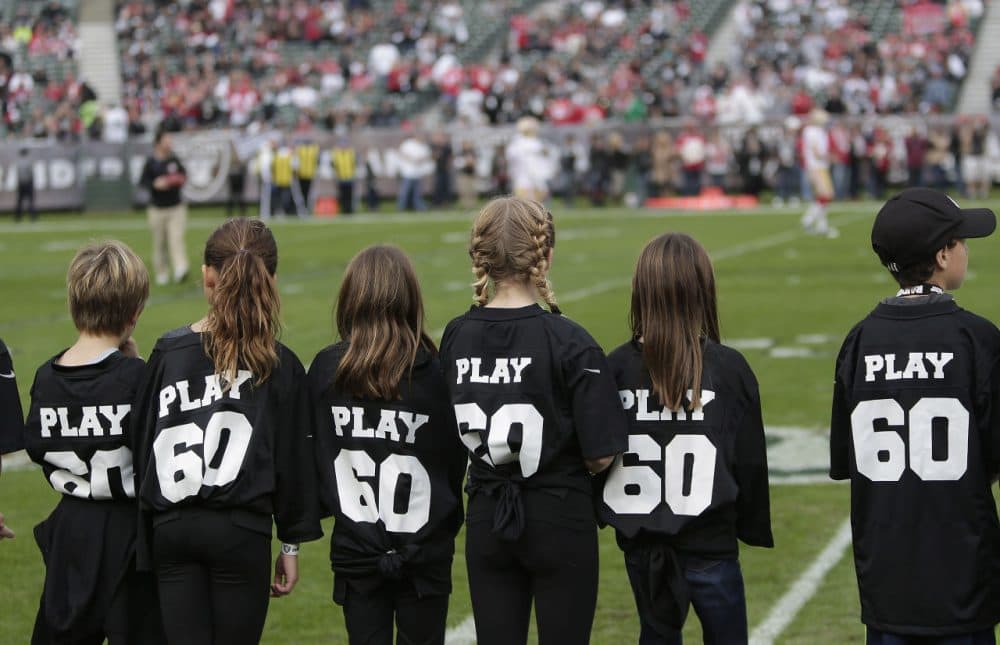Advertisement
NFL Youth Exercise Program: Healthy Fun Or Marketing Ploy?

NFL training camps are getting started after what's been a tough year or so for the league's image.
But teaching kids about exercise? Would anyone criticize that? Well, it turns out they would.
Since 2007, the NFL has been running a program that encourages kids to exercise for 60 minutes a day. In January, I attended a “Play 60 Challenge” at the Phoenix Convention Center a couple of days before the Super Bowl. On a full-sized football field, hundreds of kids wiggled, jumped, and ran in place while some NFL players and staff led the routines. We were on the second floor of the building and I could feel it vibrating. I would have loved this when I was a kid.
'Not Really About Playing Football'
[sidebar title="Tom Brady And Employee Rights" width="630" align="right"]As Tom Brady and the NFL prepare for a Deflategate legal battle, we ask employee rights expert Lewis Maltby about how things might have played out if Tom Brady delivered pizza for a living.[/sidebar]Anna Isaacson is the vice president of social responsibility for the NFL.
“It’s not really about playing football necessarily, but it’s about finding what moves you to be physically active," she told me. "And so if it’s bike-riding great, girls and boys, and if it’s football, even better.”
The girls and boys in Phoenix were part of a month-long contest that tracked how much they exercised. The NFL held the contest in schools. The teachers I spoke with were enthusiastic about it and said their students were, too. The classes with the best participation rates won a trip to the pre-Super Bowl event.
I interviewed close to 20 kids. A lot of them said that they’d done more running and push-ups because of the contest. Trayveon, a student at Bernard Black Elementary School, told me he liked that the "Play 60" program gave him a chance to "play games and have fun."
But did he track his exercise for the contest?
"Not really," he said.
Did he get exercise every day for a month for the contest?
Advertisement
"Sometimes."
"[Kids] may be exercising some, but if they really are into ['Play 60'], they’re also getting a lot of sedentary screen time.”
Josh Golin, Campaign for a Commercial-Free Childhood
“My most favorite part was mostly the Skittles. I liked that part,” she said with a laugh.
Brian Fortune teaches fourth grade at Cactus Wren Elementary in Phoenix. Free candy notwithstanding, Fortune sees anything that gets his students moving as progress.
“Most of kids nowadays are just playing video games all day long. I mean, it’s hard to pull ‘em away to do homework and kind of motivate the kids," Fortune said. "I had a kid who honestly couldn’t fit into his shirt when he got his shirt today and it was like, ‘Aww, man.’ I mean, they have to get outside and play. Even if it’s just for one month, it’s going to benefit all the kids.”
An Argument Against "Play 60"
Josh Golin disagrees.
Golin is the executive director of the Campaign for a Commercial-Free Childhood. Earlier this year, he co-authored a report titled “Out of Bounds: The NFL’s Intensive Campaign to Target Children.” I spoke to him this week.
“The NFL is hosting its websites for ‘Play 60’ in the same place where it’s hosting all of its video games, where it’s hosting its videos, its promotions for its telecasts," Golin said. "So, if kids are getting involved in ‘Play 60,’ they may be exercising some, but if they really are into it, they’re also getting a lot of sedentary screen time.”
All sports leagues try to reach kids. But with concussions and other injuries in the news, the NFL risks losing young players and fans to other sports. Golin believes that’s one reason the NFL is going further than other leagues by using what marketers call a 360-degree approach.
“Online gaming; they’re using television; partnerships with non-profit organizations like the American Heart Association; they’re using live events; in-school marketing," he said. "Any way that the NFL can reach kids, they are doing it. And all of these ways are reinforcing each other to kind of immerse kids in the brand.”
In Phoenix, I talked with NFL Vice President of Social Responsibility Anna Isaacson about about the marketing component of "Play 60."
“You guys are interested in grooming the next generation of fans, right?" I asked.
"Yeah, I mean, listen, our role in social responsibility is really to make an impact on the community and to use the NFL for good and the platform that we have to give back,” Isaacson said.
It's All Intertwined
My love of sports as a kid helped me learn about statistics and percentages and made me want to read the paper every morning to see how my teams did. And I probably saw a lot of ads because of that interest, too. But it got me out of the house, too. My friends and I spent so much time pretending we were the pro athletes we loved – like Marcus Allen and Don Mattingly. Catching the ball like they did, practicing, winning games like they did. If kids don’t learn to love star players, will they be less inspired to simply play the game?
"If you’re running around outside to pretending to be — for me it was Phil Simms or Lawrence Taylor, the NFL’s not profiting off you at that moment. But the NFL, they don’t necessarily want you to do that anymore," he said. "They want you buying their video games. They want you buying their merchandise. They want you buying the products that their players are pitching.”
But I’m not sure it’s that simple. Without marketing, the big leagues might not get as many new young fans. And without kids hooked on the promise and excitement of professional and elite college sports, amateur and youth leagues might shrink. For a lot of us watching, playing and consuming sports are all intertwined, but it’s worth thinking about the connections.
This segment aired on August 1, 2015.
